Living with anxiety is much like navigating a labyrinth without a map. The heart races, worry clouds the mind, and peace seems just out of reach. While medications such as Buspirone are commonly prescribed to ease these symptoms, many individuals find themselves drawn to the allure of natural remedies. This isn't just a leap into the unknown but rather a thoughtful journey towards holistic wellness.
Nature offers a bounty of options—herbs like lavender, supplements, and time-tested practices—all awaiting discovery. By embracing these methods, one opens the door to relief that syncs with the body’s inherent rhythm. It’s not merely about substituting one treatment for another; it's about exploring a spectrum of opportunities that complement each other.
- Understanding Anxiety and Its Impact
- Herbs and Supplements for Anxiety Relief
- Lifestyle Changes to Alleviate Anxiety
- Mindfulness and Meditation Practices
Understanding Anxiety and Its Impact
To truly grasp the magnitude of anxiety, imagine carrying an invisible weight that shapes every thought and action. It's an emotional state that can sneak up like a sudden gust of wind, often leaving individuals in a perpetual cycle of unease. Interestingly, anxiety isn't just born from stressful situations; it can arise without any clear trigger, baffling and frustrating those who experience it. From a biological standpoint, anxiety involves a complex interplay within the brain's architecture, particularly affecting areas like the amygdala, which processes fear, and the prefrontal cortex, responsible for decision-making and control.
Anxiety has varied manifestations. Some people might feel just a heightened sense of alertness, while others suffer deeply. Symptoms can range from a rapid heartbeat, sweating, and insomnia to chronic fatigue and digestive issues. This disorder doesn't discriminate by age or gender, though women are statistically more likely to experience anxiety disorders. According to the Anxiety & Depression Association of America, anxiety disorders are the most common mental illness in the U.S., affecting 40 million adults in the United States age 18 and older, or 18.1% of the population every year. The economic impact isn't negligible either, costing the U.S. more than $42 billion a year, almost one third of the country's $148 billion total mental health bill. Anxiety relief becomes crucial under such circumstances, and without proper management, it can severely impact one's everyday life, relationships, and productivity levels.
Delving deeper, we can explore how anxiety impacts not just the mind but the body as a whole. Chronic anxiety can lead to serious health problems, with elevated stress hormones like cortisol and adrenaline playing a significant role. Over time, these can increase the risk of cardiovascular issues, weaken the immune system, and even contribute to weight gain. It's a cascade effect—mental unrest leading to tangible physical symptoms. Stress management tips, yoga, and meditation practices can be helpful. They are designed to address these imbalances, aiming to restore calm and well-being.
Personal Experiences and Social Stigma
Personal experiences of anxiety can vary greatly, and it's important to address the social stigma attached to mental health disorders. Unfortunately, many still fear being judged or misunderstood, leading them to hide their symptoms or avoid seeking help. Public figures and celebrities have begun to speak up about their struggles with anxiety, fostering more openness and understanding in society. As musician Adele famously said in an interview, “I get so nervous on stage I can’t take a look at the audience. I feel like I can’t breathe.”
“You get anxiety attacks if you don't listen to your body,” remarks Arianna Huffington, emphasizing the need for mental wellness practices to gain traction in mainstream discourse.Greater awareness and acceptance can encourage those battling anxiety to seek the help and support they need, making it a collective responsibility to nurture a compassionate environment.
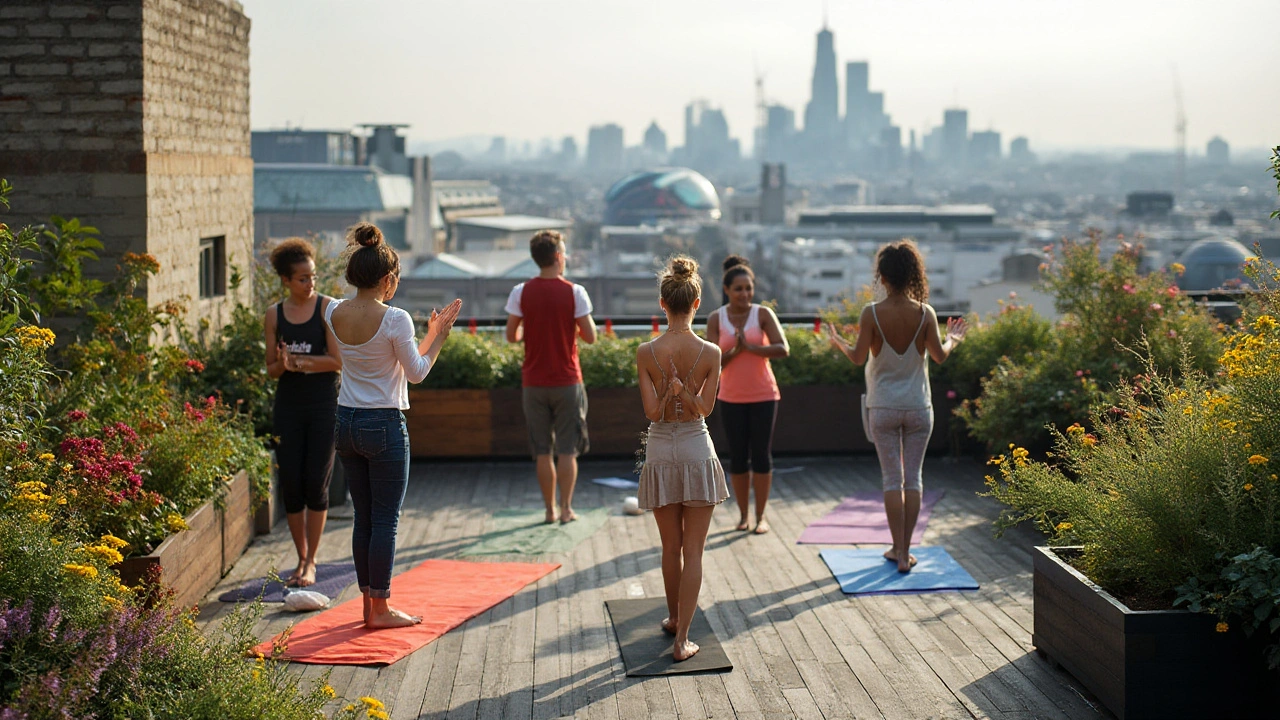
Herbs and Supplements for Anxiety Relief
In the quest for comfort and calm, herbs and supplements have long been sought after as more natural paths to anxiety relief. Strolling through a well-stocked kitchen or health store, one might be surprised by the number of ingredients that promise to soothe frayed nerves or settle a racing mind. Let's embark on a journey through nature's pharmacy, exploring the potent and gentle allies against anxiety.
Lavender: The Purple Panacea
Few scents are as universally calming as that of lavender. This aromatic herb, with its rich history in relaxation and mental wellness, stands out for its soothing properties. Studies suggest that lavender can notably reduce anxiety levels when consumed as a tea or used as an essential oil. The secret lies in its ability to affect the brain's limbic system, which plays a key role in emotions and memory.
"Lavender is truly nature’s balm," notes Dr. Sarah Brewer, a renowned nutritionist. "Its gentle touch on our nervous system is akin to that of a caring hand during turbulent times."
Whether inhaled through steam or delicately placed on the pillow, lavender's ability to calm is as effective as it is delightful.
Chamomile: The Timeless Tranquilizer
Chamomile is not just your grandmother's favorite nightcap. This unassuming flower boasts a special gift—its power to quell anxiety. Several studies have shown that chamomile can significantly decrease symptoms of anxiety. Its effects are attributed to compounds like apigenin, which binds to receptor sites in the brain responsible for inducing relaxation.
Enjoyed best as a warm cup of tea, chamomile is not just a ticket to refreshing sleep but also a warm hug for the mind. Scientists found that consuming chamomile tea daily can significantly improve insomnia symptoms, which often accompany anxiety.
Valerian Root: Nature's Valium
Valerian root is somewhat of an enigma. Known since ancient times for its sleep-promoting qualities, its impact on anxiety is profound yet not mainstream. Often consumed as a supplement, valerian root works by increasing levels of a neurotransmitter called gamma-aminobutyric acid (GABA), which helps soothe anxiety.
Its naturally bitter taste means it might not be to everyone's liking, but for those who brave it, the anecdotal evidence points to a significant reduction in anxiety symptoms. A review of studies indicated that valerian could reduce anxiety during stressful situations.
Passionflower: A Floral Fighter
Passionflower’s calming effects are so pronounced that it has been compared to some prescription medications without the dizzying array of side effects. The mesmerizing petals of this flower carry within them harmala alkaloids, which can increase levels of serotonin and dopamine in the brain. These chemicals play vital roles in mood regulation and offer a natural lift.
A daily ritual of sipping passionflower tea is akin to weaving a protective blanket against the hustle and bustle of modern life, wrapping you in calm and resilience.
While each of these natural remedies brings its unique appeal, they remind us of a simple truth: nature is teeming with gifts, waiting to wrap anxious hearts in layers of tranquility. Giving them a try could mean the difference between restlessness and restful peace.
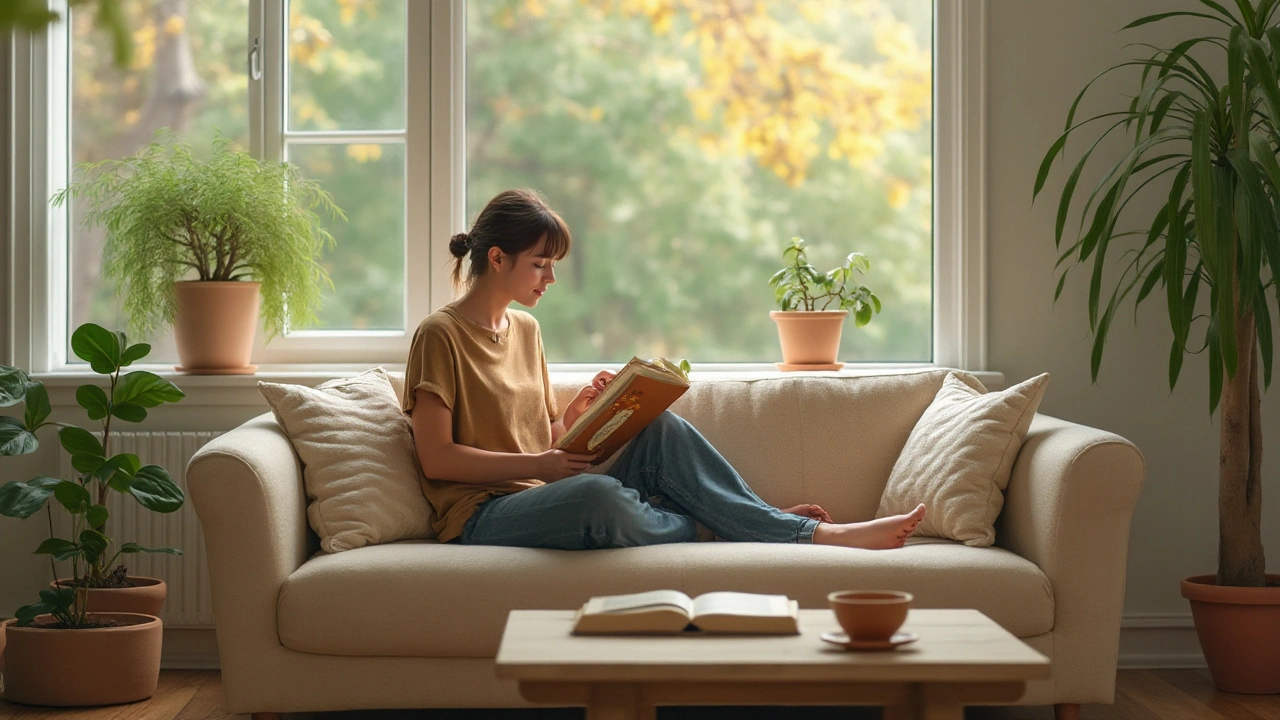
Lifestyle Changes to Alleviate Anxiety
Adapting lifestyle changes is like planting seeds of calm in the garden of the mind. Making these adjustments doesn’t mean a complete life overhaul overnight but rather embracing small, sustainable habits that promote tranquility and resilience. Engaging in regular physical activities is a natural way to manage anxiety. Exercise releases endorphins, the body's own anti-anxiety neurotransmitters. Activities like walking, swimming, or yoga can create a rhythm that harmonizes the body and mind, making anxiety feel less daunting.
The role of diet in alleviating anxiety is invaluable. The food we consume profoundly impacts our mental state. A nutritious diet brimming with omega-3 fatty acids, found in fish, walnuts, and flaxseeds, can reduce anxiety symptoms. Limiting caffeine and sugar intake is equally crucial, as they can provoke restlessness and mood swings. Additionally, staying hydrated by drinking plenty of water helps maintain energy levels, ensuring that both the body and mind remain in optimal condition.
Regular, restful sleep is another cornerstone of mental wellness. According to the National Sleep Foundation, adults need about seven to nine hours of sleep per night to function best. A calm bedtime routine can nurture good sleep hygiene, making falling into a restful slumber easier. Consider creating a comforting pre-sleep ritual like herbal tea, reading, or a warm bath away from screens. This not only aids sleep but also sets a tone of relaxation that can ripple through the next day.
Sometimes, the fast pace of modern life can feel like a relentless tide, sweeping us away in its current. Taking time to slow down and engage in hobbies and interests can be an anchor amidst this rush. Be it playing a musical instrument, crafting, or gardening, permitting oneself to indulge in favorite pastimes can significantly reduce stress levels. It's about finding a balance between life's demands and personal joy.
The American Psychological Association states, "Engaging in enjoyable leisure activities promotes positive feelings and reduces stress, which can enhance physical and mental well-being."
Social connections form another vital pillar of emotional health. Humans are inherently social creatures, and nurturing relationships can aid in keeping anxiety at bay. Whether it's spending quality time with family, reaching out to friends, or joining clubs and community groups, these interactions offer support, understanding, and a sense of belonging. Sharing experiences with others provides perspective and can transform anxiety from an isolating force into a manageable challenge.
By integrating these lifestyle changes thoughtfully, the path to anxiety relief becomes more accessible. It's turning everyday actions into practices of mindfulness and self-care. These changes, while subtle, foster a life where anxiety doesn't take center stage. Instead, it becomes a mere backdrop in the symphony of a fulfilled, balanced, and vibrant life.
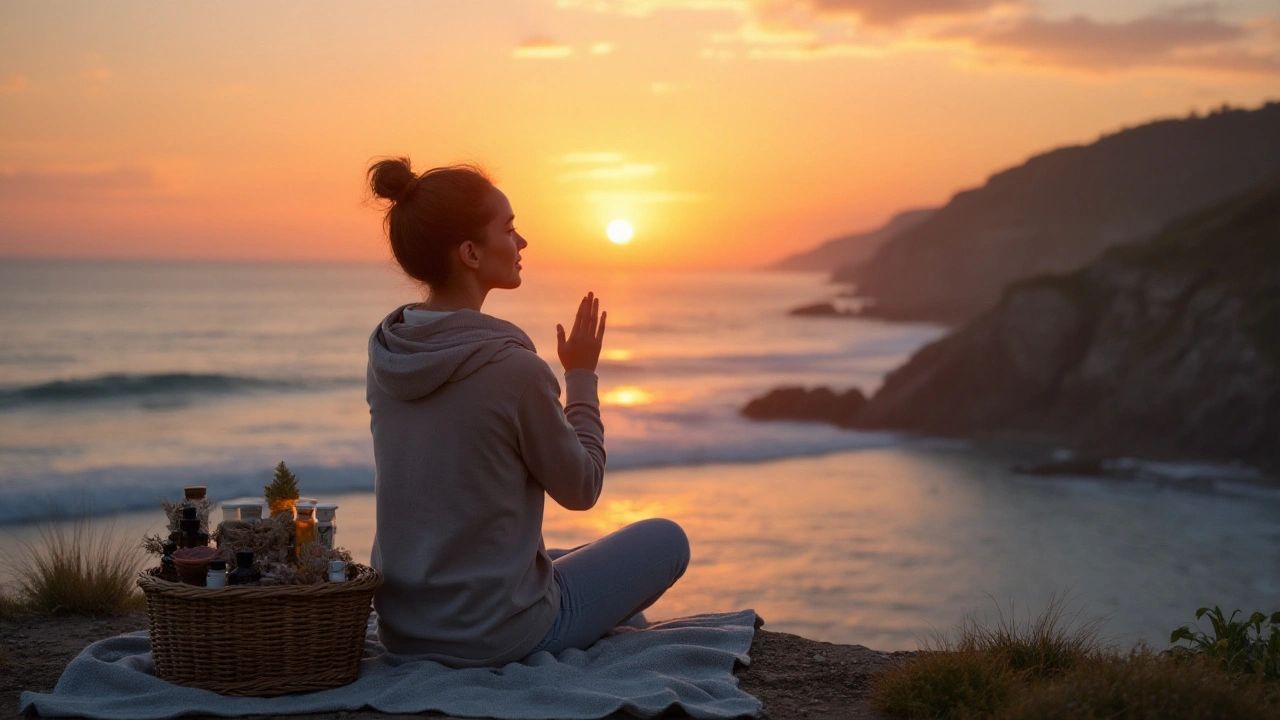
Mindfulness and Meditation Practices
Imagine the calm ripples on a pond or the tranquil sounds of a forest at dawn. These are the moments that mindfulness and meditation hope to replicate in the human mind. Mindfulness isn't just a fanciful term thrown around modern wellness discussions, it's rooted deep in centuries-old traditions with roots in Buddhism and other ancient practices. It's about being present, truly immersing in each moment without succumbing to the chaotic chatter of the mind. Mediation takes it a step further, offering a more structured way to achieve this state. Numerous studies underscore the efficacy of these practices, suggesting they reduce the production of cortisol, the stress hormone. According to a report published in 'Psychology Today', regular meditation can decrease anxiety symptoms by more than 30% over time, providing a substantial alternative to medication.
One might wonder how to begin this journey towards inner peace. The first step often involves simple, guided breathing exercises, anchoring oneself to the rhythm of inhalations and exhalations. This can be done in a quiet corner of one's home or even amidst nature, where the sounds complement the serene intention. Over time, the breathing evolves into a focus on sensations or thoughts, observed non-judgmentally. It’s crucial not to push away wandering thoughts but to acknowledge them and gently return focus to the breath or mantra. This process, often repetitive, gradually rewires the brain, fostering a calm and centered mind even amidst external chaos. For those seeking a structured approach, attending meditation workshops or using apps like Headspace or Calm can serve as valuable tools.
Integrating Mindfulness into Daily Life
While meditation practice is invaluable, integrating mindfulness into everyday activities transforms mundane tasks into meaningful experiences. Eating, for instance, can become a mindful practice. Instead of a hurried meal, take time to savor each bite, appreciating the flavors and textures. Walking is another activity that can be enriched; focus on each step, feel the ground beneath your feet, and be aware of your surroundings. These practices, though simple, have profound impacts on mental wellness and provide natural anxiety relief. Over time, these moments of mindfulness accumulate, creating a consistent buffer against stress.
"Mindfulness isn't difficult, we just need to remember to do it," Jon Kabat-Zinn once said, emphasizing its profound simplicity yet challenging execution.
As one delves deeper into these practices, the transformation becomes evident not just within the mind but in the body's response to stressful stimuli. It's an empowering realization to know that with time and patience, managing anxiety through these natural remedies is not only possible but enriches life with a renewed sense of purpose and clarity.

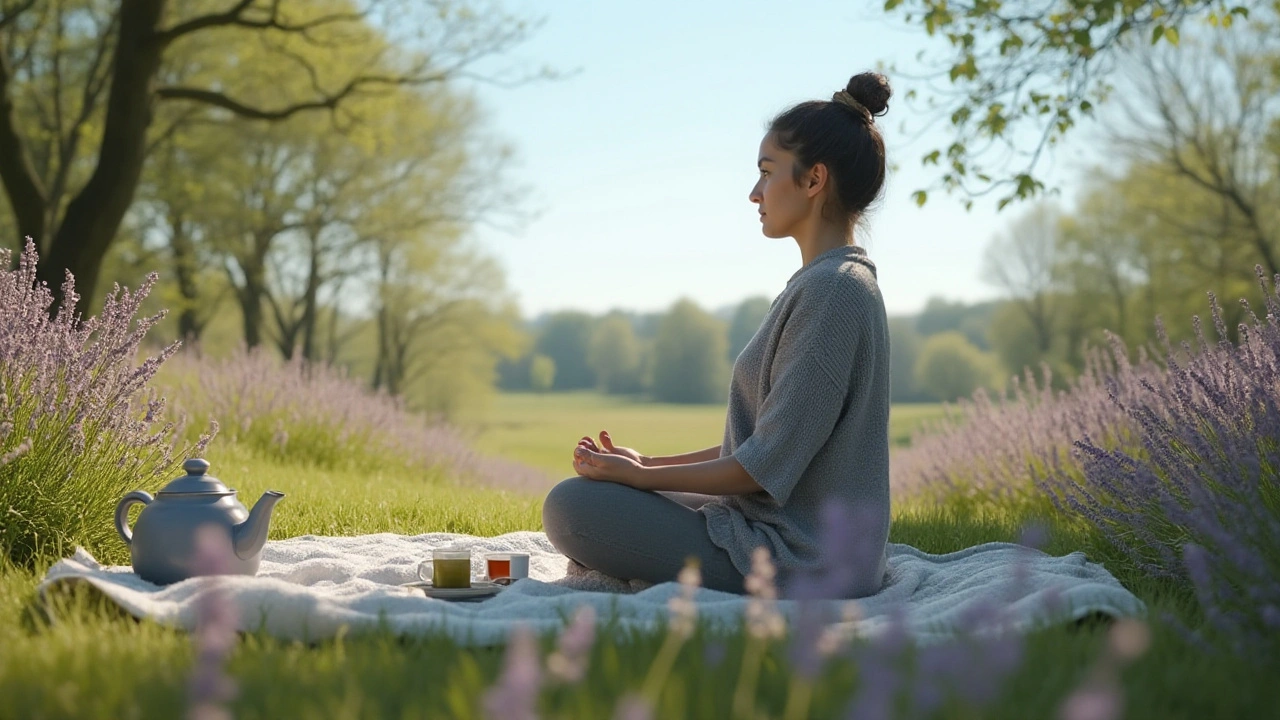


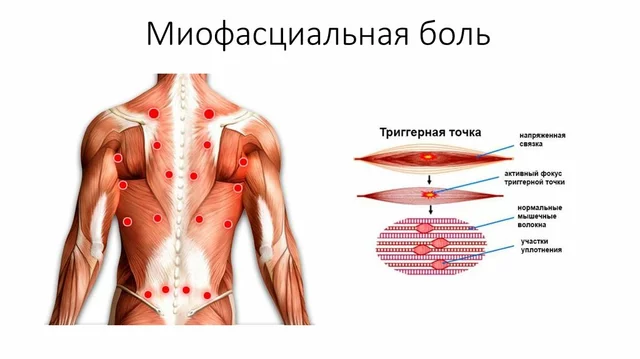
Enough with the glossy ads that claim nature is a miracle cure while the same pharmaceutical giants pull the strings behind the curtain. The truth is that the “natural” market is riddled with hidden agendas, from big‑farm lobbying to front‑group influencers who peddle lavender essential oil as a panacea. They want you to believe that a single scent can replace a decades‑long research pipeline, because a boom in sales keeps their shareholders smiling. While you sip chamomile tea, somewhere a lobbyist drafts a bill that loosens regulations on untested supplements, allowing low‑quality extracts to flood the shelves. You may think you’re escaping the grasp of Buspirone, but you’re merely swapping one form of control for another-one that’s less transparent and even harder to regulate.
Consider the chemistry: valerian root, for instance, contains compounds that interact with GABA receptors, but the dosage in over‑the‑counter capsules varies wildly, often leaving you with a sub‑therapeutic amount that does nothing but give a false sense of security. Meanwhile, the anxiety‑inducing stress of constantly hunting for the “right” blend can actually exacerbate the very symptoms you’re trying to quell. The conspiratorial reality is that the wellness industry thrives on uncertainty; the more you doubt, the more you’ll keep buying the next “organic” solution.
And don’t be fooled by anecdotal testimonials plastered on social media-those are curated, filtered, and edited to sell an image, not to convey scientific truth. If you truly want to break free, look beyond the scented candles and into the systemic forces that profit from your unease. The battle isn’t just between lavender and Buspirone; it’s between an informed citizen and an empire that monetizes every heartbeat of anxiety.
Reading through the points raised, I’m reminded that anxiety is a deeply personal experience, and while the systemic critique holds weight, we also need a compassionate lens. The act of turning to tea or a breath practice can be a form of agency, a small reclamation of control in a world that often feels overwhelming. It isn’t merely about replacing one product with another, but about fostering a dialogue with ourselves about what truly soothes our nervous system. In that sense, the ritual of preparing lavender tea can become a mindful pause, a moment to breathe consciously, rather than just a commercial transaction. Balancing critical awareness with self‑care practices may help us navigate both external influences and internal rhythms.
From a scholarly perspective, it is essential to differentiate between anecdotal efficacy and evidence‑based outcomes when evaluating botanical interventions for anxiety. Numerous randomized controlled trials have investigated lavender (Lavandula angustifolia) and reported modest reductions in the Hamilton Anxiety Rating Scale, yet the heterogeneity of study designs warrants caution. Likewise, chamomile (Matricaria recutita) has demonstrated statistically significant improvements in mild to moderate anxiety symptoms, but dosage standardization remains an unresolved issue. It is advisable for practitioners to consult peer‑reviewed meta‑analyses and consider potential drug‑herb interactions, especially for individuals concurrently using prescribed anxiolytics. Ultimately, while complementary modalities may augment a comprehensive treatment plan, they should not supplant clinically validated therapies without rigorous supervision.
Great points! To add a practical layer: when trying any herb, start with a low dose and monitor how you feel over a week before adjusting. For lavender, a few drops of 100% pure essential oil in a diffuser for 15‑20 minutes can be soothing without over‑stimulating the olfactory system. Chamomile tea-use 1‑2 teaspoons of dried flowers per cup, steeped for 5‑7 minutes-provides a gentle calming effect without the jitteriness caffeine can cause. If you’re interested in valerian, consider a timed-release capsule taken 30 minutes before bedtime to support sleep without lingering sedation. And remember to talk with a healthcare provider if you’re on prescription meds, as herbs can sometimes alter metabolism pathways.
Cool tip, thanks!